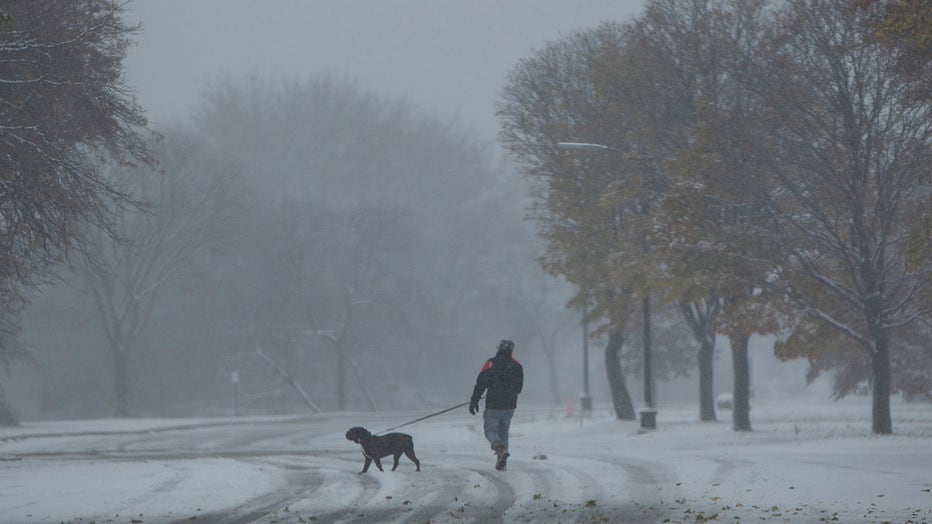It’s not over yet: Arctic blast blamed in deaths as cold shatters records from Maine to Deep South
PORTLAND, Maine - An arctic blast that sent shivers across the Midwest spread to the eastern U.S. on Wednesday, with bitter weather establishing new records from Mississippi to Maine.
Cold temperatures that stretched to the Gulf Coast followed a snowstorm that the National Weather Service said contributed to nearly 30 percent of the country being covered in snow as of Wednesday.
Snowfall and slippery roads were blamed for more than a half-dozen deaths across the country since Monday.

Chaz Gates of Grosse Pointe Park braves the snow with his English Bulldog Winston during their daily walk on Belle Isle as heavy snows hit the region Monday, Nov. 11, 2019. (Mandi Wright/Detroit Free Press/Tribune News Service via Getty Images)
In the Northeast, temperatures dipped to single digits early Wednesday in some communities. Forecasters projected even lower temperatures late Wednesday and early Thursday in some locations.
The frigid air mass was producing mid-winter conditions, even though the calendar says fall and Thanksgiving is still two weeks away, said Mark Bloomer, a meteorologist with National Weather Service in Caribou, Maine.
The NWS Caribou office warned that record cold temperatures are expected Wednesday.
Record low temperatures for the date were recorded Tuesday in New York City; Buffalo, New York; Burlington, Vermont and parts of Ohio. More daily records were broken Wednesday morning in Burlington, along with several locations in Pennsylvania.
To the south, daily records fell Wednesday across a large swath of the region accustomed to milder weather.
The temperature dropped to 18 degrees Fahrenheit (minus 8 degrees Celsius) in Birmingham, Alabama, early Wednesday, breaking the previous low record of 22 degrees Fahrenheit (minus 6 degrees Celsius) set in 1911. More than 100 other sites in Alabama also reached historic lows for the day, officials said.
The temperature dropped to 18 degrees Fahrenheit (minus 8 degrees Celsius) in Birmingham, Alabama, early Wednesday, breaking the previous low record of 22 degrees Fahrenheit (minus 6 degrees Celsius) set in 1911. More than 100 other sites in Alabama also reached historic lows for the day, officials said.
In Greenville, Mississippi, the temperature dropped to 17 degrees Fahrenheit (minus 8 degrees Celsius), breaking a record of 23 degrees Fahrenheit (minus 5 degrees Celsius) set 108 years ago, officials said.
Even the Gulf Coast saw temperatures below freezing, producing “sea smoke” as chilly air moved over warmer water.
The cold air followed heavy snow that reached as far south as Tennessee. In celebration of Veterans Day on Monday, a massive American flag was draped off the side of North America’s longest pedestrian suspension bridge at the Gatlinburg Skylift Park in Gatlinburg, Tennessee. A viral video of the draping showed fall colors in the surrounding area, which was free from snowfall, but Wednesday morning, a new video from the park showed a thick blanket of snow covering everything in sight.
Slippery conditions were blamed for road deaths since Monday in Michigan, Kansas and Ohio. The Eaton County Sheriff’s Office in Michigan announced in a Facebook post Monday that three adults were killed in a two-vehicle crash.
In southwestern Michigan, a man died Tuesday after getting trapped beneath machinery he was using to clear snow from his marijuana grow business.
As the wintry conditions persist, the NWS urges those in affected areas to reduce driving speed and to keep headlights turned on while navigating snowy and icy roads.
This story was reported from Los Angeles. The Associated Press contributed.

